What if you could save up to 40% on operational costs by outsourcing software development?
A 2022 global outsourcing report by Deloitte asked 40 company executives across the Americas, Africa, Europe, Asia, and Australia and found that to be the average cost reduction when outsourcing.
The software development industry is buzzing with the word “outsourcing,” but how do you navigate this landscape without stumbling?
In this article, we will talk about:
- Why software development outsourcing services is the new black in product development.
- From cost savings to specialized skills—why businesses are jumping on the bandwagon.
- Case studies and examples of software outsourcing services that prove the pudding.
- The pitfalls and how to sidestep them.
P.S., If you’re looking to outsource software development for a project, you need to choose the right outsourcing partner. Schedule a free consultation with Miquido today to find out why dozens of companies trust our software development process to create world-class products.
Why Do So Many Companies Outsource Software Development?
The Proof’s in the Pudding: With predictions saying the global outsourcing scene could hit a mind-blowing USD 525.2 billion by 2030, it’s clear this isn’t just a phase. If you’re not on this train, you might just miss out on the benefits of outsourcing.
In this section, we’ll delve deeper into the biggest benefits of software development outsourcing.
1. Cost-Effectiveness
Getting top-notch work doesn’t have to mean emptying your pockets. Here’s what software outsourcing can do from a cost perspective:
- Reduced Operational Costs: Imagine developing a project without the overheads of additional hardware, software, and workspace.
- Access Without the Full Price: Engage with top-tier talent without the financial commitment of full-time salaries and benefits. For example, when it comes to IT services in cybersecurity, outsourcing in the US might cost you about 101,630 USD per year for one specialist, whereas you can hire one from Ukraine at 22,304 USD per year (78% cost reduction or $79,326) with the same level of quality.
- Budget Allocation: Free up funds for other crucial aspects like marketing, allowing for a well-rounded strategy. For instance, reallocating funds saved from third-party outsourcing to a targeted marketing campaign can amplify your reach and impact.
2. Access to Specialized Skills
With globalization, why stick to just the folks next door when there’s a whole world of genius minds out there? With software outsourcing companies also get access to specialized skills – whether it’s AI, blockchain, or IoT, outsourcing gives you instant access to experts in niche technologies. No need for lengthy and costly in-house training.
- Diverse Expertise: Engage with professionals who bring varied and specialized skills to your project, from UI/UX design to backend development.
- Innovation at Its Peak: Leverage the innovative approaches and fresh perspectives that external teams bring to the table.
- Quality Assurance: With specialized skills, comes an assurance of quality and functionality in every aspect of the project.
3. Accelerated Time-to-Market
In a world where the early bird gets the worm, outsourcing accelerates your development cycle to give you an edge over the competition. You have a dedicated team focused entirely on the quality of the project. No distractions.
- Efficient Development: A dedicated external team can fast-track the development phase, ensuring a timely launch.
- Beating the Competition: A quicker launch means capturing your market segment before competitors make their move.
- First-Mover Advantage: Establishing your product early allows for better market penetration and brand recognition.
4. Free Up Your A-team
By outsourcing some of the heavy lifting, your in-house crew gets a breather. This means they’ve got more time to tackle other big-deal projects, brainstorm those game-changing ideas, or just perfect what they’re already awesome at. It’s all about playing to everyone’s strengths.
- Strategic Focus: Ensure your in-house team remains focused on strategy, operations, and decision-making.
- Marketing Mastery: With technicalities handled, your software development team can craft and execute a stellar marketing strategy, ensuring your product makes waves upon launch.
- Customer Engagement: Allocate more resources towards customer engagement and relationship building, ensuring a solid foundation for your product in the market.
5. Scalability & Flexibility on Demand
Need to ramp up your team for a big project or scale down in slower times? Outsourcing to software development companies offers that flexibility without the HR headaches.
When the going gets tough (or super busy), outsourcing is like your secret weapon. Whether you want to bulk up your squad for a major rollout or take it down a notch during the quieter months, outsourcing’s got your back, minus all those HR migraines.
- Agile Adjustments: With outsourcing, your team size can ebb and flow with the tide of projects. This dynamic adaptability is gold in the ever-changing tech world.
- Tech Toolbelt Expansion: Dabble in new technologies or explore niche areas without committing to a full-time specialist. Outsourcing lets you get the expertise only when you need it.
- Budget Breather: Flexibility means you’re only investing in extra hands when necessary, giving your budget some room to breathe (or stretch into other cool stuff).
- Fresh Perspectives: Shaking up your team occasionally with outsourced talent can bring in some fresh ideas and approaches, keeping things lively and innovative.
6. Risk Mitigation: Sharing the Load
Going solo in the tech world can feel like a tightrope walking without a net. But, with a trusty outsourcing partner by your side, you’re sharing that precarious balancing act. Dive deep into custom software development knowing it’s not just you on the line.
- Shared Responsibility: When hiccups happen (and they will!), it’s comforting to know you’re not alone. An outsourcing partner means shared accountability, making those bumps a tad smoother.
- Backup Brainpower: Two heads (or teams) are better than one. Outsourcing can offer a secondary perspective to problem-solve and troubleshoot, reducing the chances of any single point of failure.
- Financial Safety Net: If things go south, it’s not just your wallet on the line. With shared investments come shared financial risks, offering a cushion against unforeseen expenses.
- Diverse Expertise: With varied teams comes varied knowledge. Your outsourcing partner might spot pitfalls or risks that you hadn’t even considered, providing a proactive approach to challenges.
It’s no surprise that the US has the highest percentage of outsourced jobs in the world, with almost 68% of companies delegating their services. The UK, meanwhile, has around 48% of companies offshoring business functions with talent shortage as the main factor.
Pro Tip: When outsourcing a software development company, keep an eye out for relevant case studies of similar software development services, positive client reviews, and great communication. It makes all the difference between a successful project and a costly mistake.
Does Outsourcing Software Development Projects Actually Work? [Success Stories by Miquido]
“Software development outsourcing is great!!”
But what does that look like? In this section, we’ll showcase some of our best long-term projects as a software development outsourcing company delivering end-to-end custom software solutions that enhance mobile and digital experiences for users.
1. Topline by Abbey Road Studios
Miquido helped Abbey Road Studios develop Topline, an app that allows musicians to save their song ideas instantly and listen back to them easily.
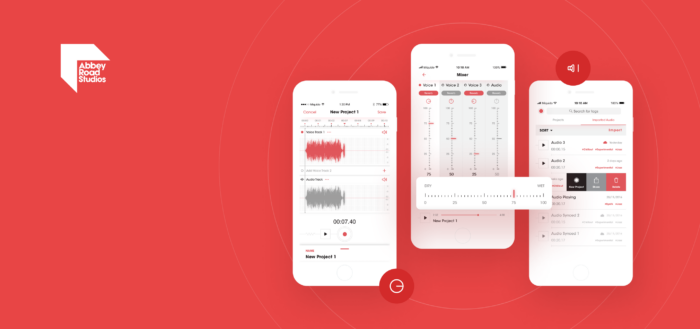
- Challenge: The need was to create a web and mobile app that is easy to use, allowing musicians to focus on their creative process without technical distractions.
- In-house could’ve taken double the time. Miquido achieved rollout in just 10 weeks.
- In-house hiring and training could inflate costs by up to 50%. Miquido offered a cost-effective solution.
- Solution: Miquido developed an app that allows users to record their musical ideas, lyrics, and even visuals in a quick and straightforward manner.
- Outsourced Success:
- Rapid Rollout: Native iOS and Flutter versions in a mere 10 weeks.
- Spotlight & Awards: Featured at Google I/O 2018 and bagged two UK App Awards.
- Tech & Services: Outsourcing to Miquido enabled Topline to harness the best in tech: Miquido’s blend of UI/UX Design and Mobile Development, powered by Swift and Flutter.
HelloFresh
HelloFresh is a meal delivery service that operates primarily through a mobile app, bridging the gap between chef-curated meals and the convenience of home delivery. With a focus on wholesome recipes, they worked with Miquido to create an app that ensures meals are both nutritious and tailored to individual health needs.
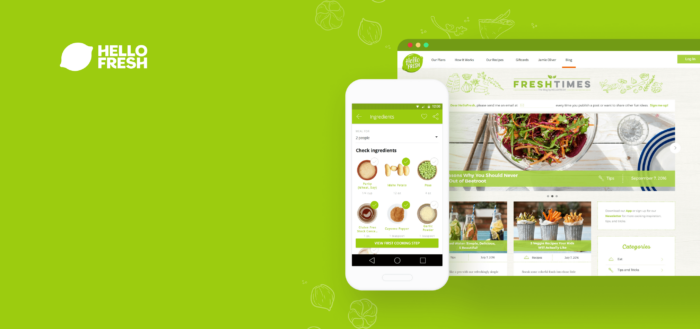
The Outsourcing Advantage: Collaborating with Miquido as a service provider gave HelloFresh access to a wealth of tech expertise, accelerating their transformation from a simple meal delivery service to a digital culinary powerhouse.
- In-house delays are no longer an issue: Building in-house might have prolonged app launch by months, potentially missing a rapidly growing market.
- Less resource drain: Maintaining an in-house team for such a vast project could inflate costs by 40-60%.
Challenge: Digitalize the fresh food shopping experience, emphasizing ease, efficiency, and dietary customization.
Miquido’s Solution:
- Thoughtful Design: Keeping users front-and-center, the app’s design prioritized intuitive navigation. Ordering chef-created meals became as easy as a few taps.
- Flexible Plans: With a variety of meal plans, users could customize their culinary experience, all thanks to the flexibility integrated into the app.
- Educational Component: Beyond just meals, Miquido helped roll out the Hello Fresh Blog, catering to a growing audience keen on understanding healthy eating.
Outsourced Success:
- 1 Million daily active users – a testament to a user-friendly design.
- A valuation that soared to €2.6 Billion.
- Recognition as the No. 1 meal-kit company on the global stage.
Services & Tech: Outsourcing to Miquido allowed HelloFresh to leverage cutting-edge tools: Android, Golang, PHP, and React, all unified for a seamless user experience.
Accolades: The fruit of this outsourced collaboration? The HelloFresh app was lauded as one of Google’s “Best Apps of 2016”. Outsourcing to Miquido didn’t just meet expectations – it exceeded them.
Pro Tip: If you’re going to outsource software development services, make sure your outsourcing partner understands your core business and has experience in your industry.
Onkyo Music
Onkyo Music sought a high-resolution audio platform to cater to dedicated audiophiles.
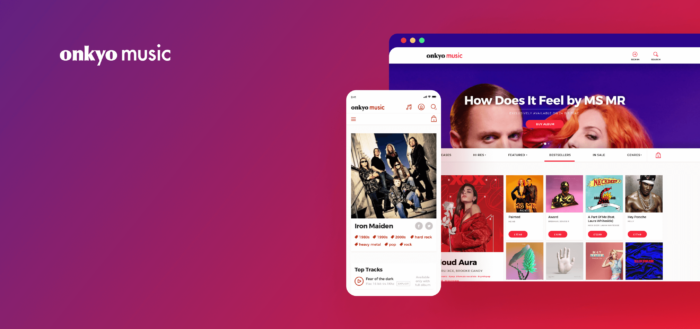
The Outsourcing Advantage: Partnering with Miquido, a specialist in digital solutions, provided Onkyo Music with the expertise needed to achieve high-quality audio and cross-device adaptability.
Challenge: Create a versatile platform delivering premium audio quality—ranging from 44.1kHz/16 bit to 352.8kHz/24bit.
Miquido’s Solution: Harnessing Angular, Node.js, and a custom CMS, Miquido enhanced the Onkyo app’s speed and adaptability, exemplifying the power of outsourcing for optimal technical solutions.
Outsourced Success:
- An unmatched 16k MQA tracks resource.
- An entire project turnaround in a mere 3 months, showcasing the efficiency of outsourced project management.
Tech Used: Cutting-edge tools like Angular and Node.js, further emphasizing the benefits of drawing on external specialized expertise.
Client’s Word: “Our day-to-day communication was seamless.” – Phil Quigley, Client Operations Manager, 7digital. Outsourcing to Miquido ensured streamlined communication and top-notch results.
Herbalife GO
Herbalife, a global nutrition giant, provides health-conscious consumers with top-notch supplements and meal replacement products.

Challenge: Craft a unified platform for effortless product ordering, meticulous meal planning, and fitness progress tracking.
Outsourced Success:
- Swift Execution: In a mere 6 months, Miquido sculpted the HerbalifeGO app, ensuring its grand debut at the annual Herbalife Extravaganza event.
- Significant Impact: With over 50k downloads on Google Play and a feature of 56 localized product catalogs, the app clearly resonated with its target audience.
Services & Tech: Herbalife leveraged Miquido’s vast tech toolkit: Android, iOS, and a gamut of AWS services, accentuating the advantages of strategic outsourcing.
Client Acclaim: Herbalife’s Software Product Manager hailed Miquido’s unparalleled professionalism and depth of knowledge, reaffirming the dividends of their partnership choice.
Picniic
Picniic bridges the gap for families juggling multiple tasks by consolidating lists, notes, and schedules into one revolutionary app, ensuring familial harmony and productivity. They sought Miquido’s prowess to deeply understand and cater to the unique task-management challenges of families.

Challenge: Craft a cohesive platform to seamlessly integrate a medley of family-related tasks, eliminating the fuss of toggling between numerous apps.
Outsourced Success:
- Research-Driven: Miquido’s approach commenced with in-depth research, tapping into the specific needs of parents and children.
- Clear & Intuitive: With a blend of impeccable UX/UI design, the app manifested as an effortless tool for families, elevating the mundane tasks of daily life.
Services & Tech: Picniic benefited from Miquido’s expertise in Android, combined with top-notch mobile and web development, reinforcing the app’s foundational strength.
Tangible Milestones: 50k+ downloads on Google Play and a significant $3M in funding over two investment rounds showcase the app’s vast success and potential.
Are There Any Considerations When Outsourcing Software Development?
Alright, so outsourcing sounds like a dream, but let’s not sugarcoat it. There are hurdles along the way. Knowing what they are and how to dodge them can make all the difference. Let’s dive in.
Communication Barriers
Language and communication can be stumbling blocks. The fix? Choose a partner fluent not just in English but also in tech jargon.
- Language Proficiency: Ensuring both teams are proficient in a common language avoids miscommunications and ensures clarity in software development project execution.
- Agile Communication: Adopting agile communication practices, like daily stand-ups, even in a virtual format, keeps everyone aligned and abreast of project developments.
- Utilizing Collaboration Tools: Leverage tools like Slack or Microsoft Teams to streamline communication and create a centralized hub for project discussions and updates.
Quality Control
Worried about the quality of work? A best outsourcing partner will have stringent quality assurance processes in place. Always ask for samples or a pilot project to gauge quality. Ensuring the final product is not just sea-worthy, but also robust and reliable, is crucial in the outsourcing journey.
- Defined Standards: Establish and communicate clear quality standards and expectations from the get-go.
- Regular Check-Ins: Implementing regular check-ins and reviews ensures the project stays on course.
- Feedback Loop: A continuous feedback loop ensures any discrepancies are ironed out promptly, maintaining the quality of the project.
Pro Tip: Use tools like Jira or Asana for project management. It keeps everyone accountable and ensures quality control.
Time Zone Differences
It can be tricky coordinating with teams across different time zones. This is where nearshore software outsourcing can be powerful since you’re not relying on talent that is halfway across the globe.
However they can also work in your favor. While you’re asleep, your outsourcing team can be resolving issues, making for a 24/7 operation. Navigating through different time zones can be tricky but is manageable with the right strategies in place.
- Overlapping Working Hours: Ensure there are a few hours of overlap to facilitate real-time communication and collaboration.
- Scheduled Updates: Implement a system of scheduled updates to keep all parties informed, even when working hours don’t overlap.
- Using Asynchronous Communication: Leverage tools and platforms that facilitate asynchronous communication, ensuring messages and updates are not lost in the time gap. For instance, Quidlo is an online time tracker and task management tool that helps remote teams track hours worked and project progress.
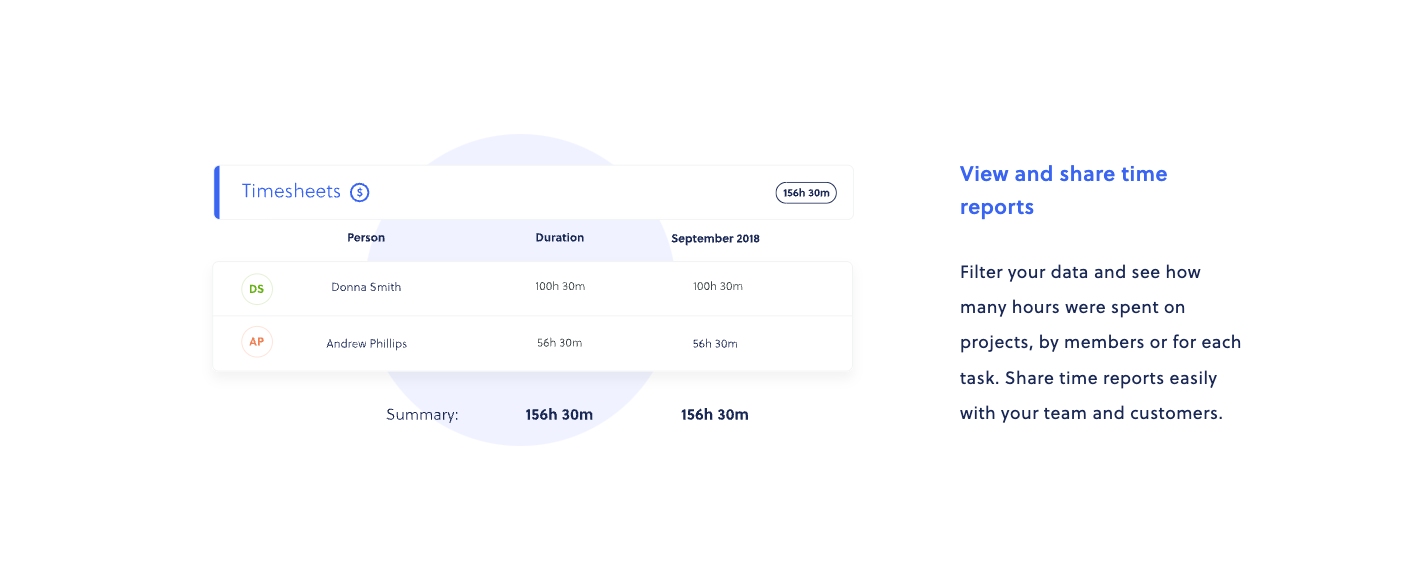
- Flexible Meeting Schedules: Adopt a flexible approach to meetings, ensuring all parties can participate without compromising their work-life balance.
Data Security and Confidentiality
According to Cybersecurity Ventures, the damage costs due to cybercrime are expected to hit $10.5 trillion annually by 2025. Data breaches are a nightmare. Don’t be a statistic. Ensure your outsourcing partner complies with international data security standards like ISO 27001 or GDPR.
Let’s tackle the big one: data security. It’s a concern that keeps many a business leader up at night. But here’s the deal—outsourcing doesn’t have to mean compromising on security. Quite the opposite.
- Secure from the Get-Go: Right from the contract stage, make sure data security clauses are airtight. This sets the ground rules and expectations for both parties.
- Compliance is Key: Ensure your outsourcing partner complies with international data security standards. We’re talking ISO 27001, GDPR, and any industry-specific regulations that apply to you.
- Regular Audits: Don’t just set it and forget it. Regular security audits can help you keep tabs on data integrity.
- Encryption and Backups: Data should be encrypted during both transmission and storage. Also, regular backups can be a lifesaver in case of any security incidents.
Pro Tip: Use multi-factor authentication (MFA) for an added layer of security. It’s simple but effective.
Budgeting and Costs
When it comes to outsourcing, sticking to a budget can be trickier than it seems. While outsourcing often offers cost savings, unforeseen expenses can arise.
Here’s how to keep your project cost-effective:
- Expected Costs: This encompasses what you might predict: developer rates, software or tool licenses, and overheads related to infrastructure.
Hidden Costs:
- Ramp-Up Time: Adjusting to a new project and understanding your company’s culture and goals isn’t immediate. This “learning curve” can incur additional costs. This could be direct training expenses and reduced initial productivity. Overseeing the new team might demand more time, and misunderstandings could lead to revisions. It’s crucial to factor these into your project timeline and budget when considering outsourcing.
- Communication Overhead: Increased meetings and communications to sync with remote teams can add up.
- Training and Onboarding: Transferring knowledge and training the outsourced team on your specific tools and processes.
- Currency Fluctuations: If you’re paying in a currency different from yours, currency value changes can affect your costs.
- Exit Costs: Should you need to end the partnership, there might be costs involved in transitioning the project in-house or to another vendor.
Pro Tip: Always allocate an additional 10-20% of your total project budget for unforeseen expenses. Tools like Expensify or QuickBooks can assist in tracking and managing these costs.
How to Find the Perfect Software Outsourcing Company
Finding the right software outsourcing partner can be daunting, but these strategic steps can simplify your quest:
- How to thoroughly vet potential partners: Begin by researching reviews on platforms like Clutch or GoodFirms. Initiate direct dialogues with their past clients, and consider starting with a pilot project to gauge their capabilities firsthand. What specifically should you look out for?
- Infrastructure and Scalability: Does the vendor have the requisite infrastructure? Can they scale teams quickly if needed?
- Problem-Solving Prowess: Past instances where they’ve overcome project hurdles can be a testament to their adaptability and resilience.
- Cultural Fit: Ensure that the company’s culture aligns with yours, especially concerning communication, feedback, and values.
- Tech Stack Alignment: Their technology stack should either align with yours or complement it.
- Evaluating their expertise: Check if their skill set aligns with your project needs, such as specific language proficiency or domain knowledge. For instance, fintech projects would benefit from a partner familiar with financial regulations.
- Deep dive into their portfolio: Besides browsing completed projects, examine if they’ve handled similar challenges. Focus on real-world outcomes, such as notable user retention improvements or sales boosts they’ve achieved.
- Analyze client testimonials: Platforms like Trustpilot or Google Reviews provide genuine feedback. Patterns in testimonials can give a clearer image of the company’s strengths and weaknesses.
Pro Tip: Prioritize open communication. Tools like Slack or Trello can streamline project management and foster a collaborative spirit with your chosen partner.
How to Ensure a Successful Software Outsourcing Experience
- Set Clear Objectives:
- Goal Definition: Determine your core goals. Ask questions like: “What business problem am I solving?” or “What competitive advantage am I seeking?” Strategies like the SWOT analysis can be instrumental in pinpointing objectives.
- Milestone Creation: Plot out key deliverables. Monthly check-ins are often effective, but for larger projects, consider bi-monthly or quarterly reviews. For instance, if it’s a software development project, milestones might include prototype completion, beta testing, or user acceptance testing.
- KPI Establishment: Use KPIs like ‘Delivery Timelines’, ‘Budget Adherence’, and ‘Bug Frequency in Beta Testing’ to quantify success.
- Stay aligned: A well-prepared team is a productive one. Here’s how to get your outsourced team up to speed:
- Company Culture Handbook: Share a guidebook highlighting company values, communication norms, and expected behaviors.
- Training Modules: Create modules specific to the tools and processes your company uses. Platforms like TalentLMS can help host these training sessions.
- Regular Feedback: Especially in the initial stages, provide regular feedback to ensure alignment.
- Prioritize Communication:
- Consistent Check-ins: Schedule weekly or bi-weekly discussions. For instance, Mondays can be about setting the week’s goals, and Fridays for weekly wrap-ups.
- Utilize Tech Tools: Platforms like Slack (for communication), Trello (for task management), or Asana (for project management) can be invaluable. Remember, the right tool depends on the project’s complexity and team size.
- Incorporate Feedback: Tools like Google Forms can be used to gather regular feedback from stakeholders. This ensures alignment and drives constant refinement.
- Legally Secure Your Project:
- Legal Framework: Contracts should be reviewed by legal professionals familiar with IT outsourcing. NDAs should specify what’s considered confidential and for how long.
- Data Integrity: Ensure adherence to standards like GDPR (if dealing with EU customers) or CCPA (for Californians). An example question to ask might be, “How is user data encrypted and stored?”
- IP Protection: Your contract should specify who owns the product’s codebase, designs, and any other deliverable.
- Maintain Oversight and Learn:
- Project Analysis: Look into adherence to timelines, quality of deliverables, and the efficacy of communication. Were there any recurrent issues? How were crises handled?
- Document Insights: Maintain a ‘Lessons Learned’ document. For instance, if you found bi-weekly check-ins insufficient, this could be changed in future projects.
- Cherish Achievements: Celebrate through team lunches, bonuses, or even simple public acknowledgment. This boosts morale and reinforces positive behavior.
- Remember to Plan for Risk: All projects—outsourced or in-house—carry risks. Being proactive in identifying and managing these risks is key:
- Contingency Planning: Outline a plan for potential pitfalls—be it missed deadlines, unsatisfactory work, or unexpected project termination.
- Exit Strategy: Clearly define the process and conditions under which either party can exit the agreement.
- Backup Vendors: Research and maintain a list of alternative vendors. If your current partnership goes south, this ensures minimal project disruption.
Pro Tips:
- Tools like Risk Register can help document and track potential risks, helping you address them systematically.
- A dedicated project manager from your side, familiar with both your company’s domain and basic software development principles, can be the linchpin for a project’s success.
Making Sure It’s a Smooth Transition After The Project
After the project’s successful completion, a smooth transition is vital to ensure continuity and consolidate learnings:
- Knowledge Transfer: Organize sessions where the outsourced team can transfer knowledge to your in-house team.
- Documentation Handover: Ensure you receive all project-related documents, including codebases, design docs, and user manuals.
- Tool/Platform Transition: If the project used specific tools or platforms, transition access, and control back to your team.
Looking to Outsource Your Next Big Idea? We’re Here For You.
Outsourcing software development can be a game-changer when executed with precision and strategy. You’re now armed with the knowledge and tools to make it a success. Here’s a quick reminder:
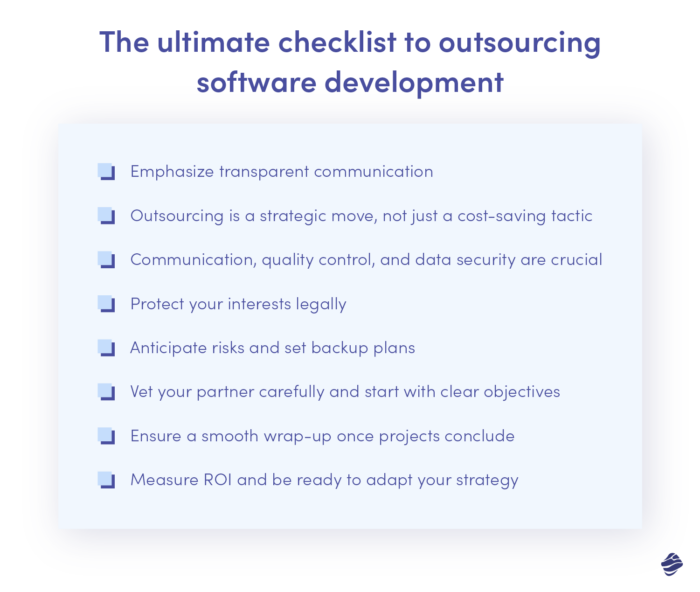
Now, onto the practical bit. While understanding is half the battle, to find the right outsourcing software development companies is essential. That’s where Miquido steps in. As a trusted custom software development company, Miquido makes outsourcing feel less like a leap of faith and more like a step forward. Dive into seamless software solutions, tailored just for you.

![[header] everything you need to know about software projects outsourcing](https://www.miquido.com/wp-content/uploads/2023/12/header-everything-you-need-to-know-about-software-projects-outsourcing.jpg)







